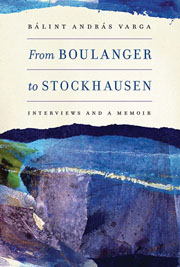Book contents
- Frontmatter
- Dedication
- Contents
- Foreword
- Acknowledgments
- Part One Interviews
- Part Two A Memoir
- Introduction
- Chapter 1 Ancestors
- Chapter 2 On Being Jewish
- Chapter 3 Growing Up in Postwar Socialist Hungary
- Chapter 4 Margit
- Chapter 5 Tapespondence
- Chapter 6 Birth and Demise of a (Counter)revolution: A Boy's-Eye View
- Chapter 7 Broadcasting 1
- Chapter 8 Broadcasting 2
- Chapter 9 Editio Musica Budapest
- Chapter 10 Interviewing: An Obsession
- Chapter 11 Ich war ein Berliner
- Chapter 12 Moving to Vienna
- Chapter 13 Universal Edition
- Chapter 14 Back Catalogue
- Chapter 15 The Psychology of Promotion
- Chapter 16 Farewell and After
- Notes in Retrospect
- Index
- Miscellaneous Endmatter
Chapter 10 - Interviewing: An Obsession
from Part Two - A Memoir
Published online by Cambridge University Press: 05 January 2014
- Frontmatter
- Dedication
- Contents
- Foreword
- Acknowledgments
- Part One Interviews
- Part Two A Memoir
- Introduction
- Chapter 1 Ancestors
- Chapter 2 On Being Jewish
- Chapter 3 Growing Up in Postwar Socialist Hungary
- Chapter 4 Margit
- Chapter 5 Tapespondence
- Chapter 6 Birth and Demise of a (Counter)revolution: A Boy's-Eye View
- Chapter 7 Broadcasting 1
- Chapter 8 Broadcasting 2
- Chapter 9 Editio Musica Budapest
- Chapter 10 Interviewing: An Obsession
- Chapter 11 Ich war ein Berliner
- Chapter 12 Moving to Vienna
- Chapter 13 Universal Edition
- Chapter 14 Back Catalogue
- Chapter 15 The Psychology of Promotion
- Chapter 16 Farewell and After
- Notes in Retrospect
- Index
- Miscellaneous Endmatter
Summary
I wonder if parents realize that a remark they happen to drop at one point makes a mark on their children's minds for life. My mother suggested that I should not talk too much about myself. Nobody will be really interested—people prefer to do the talking and want listeners. She was right. On the few occasions I have for some obscure reason misinterpreted signals coming from other people and launched into a subject that was occupying my mind, I soon noticed their eyes wandering as though looking for help. Their nods were automatic, though meant to signify agreement or the fact that they were following what I was trying to say.
Over the years and decades, I have become a good listener. Asking questions is my way of conducting a conversation. In a way, I do interviews all the time. Otherwise I am quiet; I sit in silence and feel comfortable. Knowing what questions to ask and timing them well have proved helpful as a means of avoiding awkward silences. Far more important is the attitude behind it: the curiosity to find out about lives, to learn what makes people tick.
Hitchhiking appears to be more or less obsolete now but I used to enjoy taking a young person with me on a longer ride and asking them about their lives. I had never seen them before and was unlikely to meet them again—perhaps that is why many of them opened up and told me things they probably would not have had we met socially.
- Type
- Chapter
- Information
- From Boulanger to StockhausenInterviews and a Memoir, pp. 324 - 327Publisher: Boydell & BrewerPrint publication year: 2013



